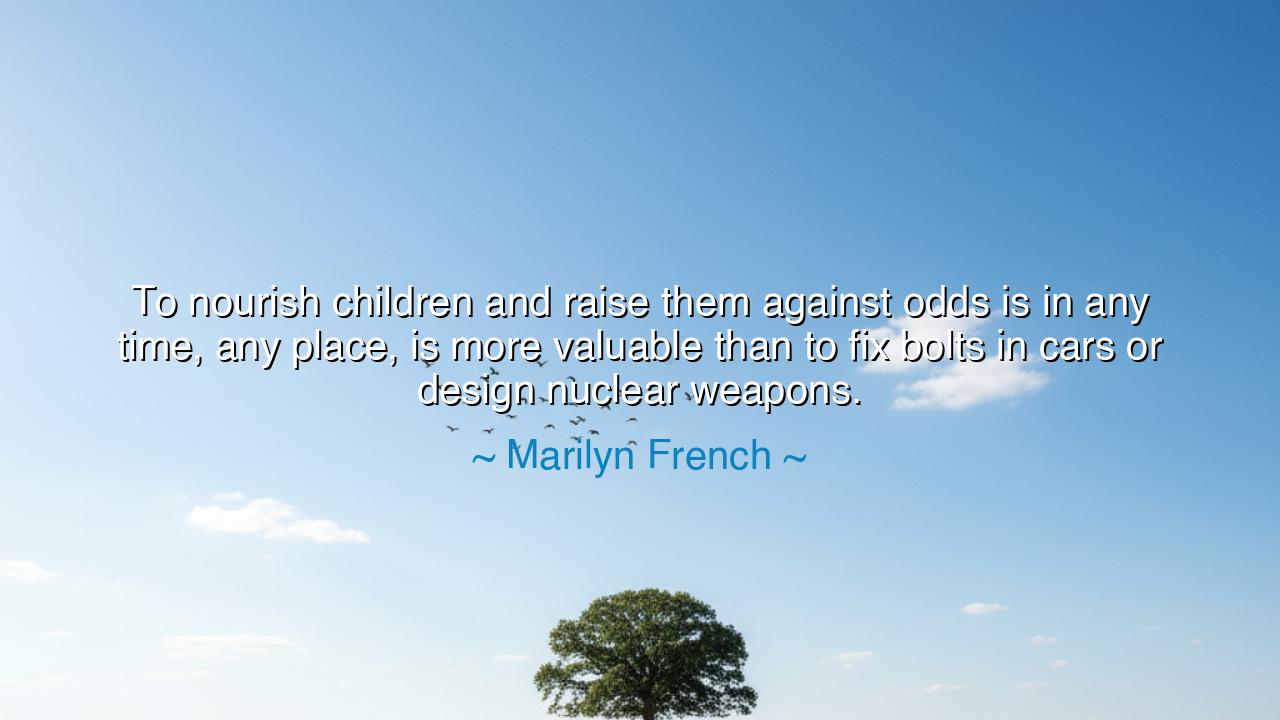
To nourish children and raise them against odds is in any time
To nourish children and raise them against odds is in any time, any place, is more valuable than to fix bolts in cars or design nuclear weapons.






The words of Marilyn French—“To nourish children and raise them against odds is in any time, any place, more valuable than to fix bolts in cars or design nuclear weapons”—resound like a hymn to the quiet, unseen heroism of care. In a world that often worships invention and power, French’s voice rises to remind us that the greatest creation is not the machine or the weapon, but life itself. Her words spring from a heart attuned to the sacred labor of mothers, fathers, teachers, and caregivers—those who, against hardship and history, continue to protect and nurture the fragile flame of humanity. It is a truth both tender and thunderous: that to raise a child, to keep them fed and alive in a world of storms, is an act of defiance greater than any conquest.
Marilyn French was a writer of fierce intellect and compassion, best known for her novel The Women’s Room, in which she laid bare the struggles of women caught between expectation and survival. Her words about raising children were born from the recognition that the world often undervalues what is most essential. In her time—and in ours—society celebrates the engineer, the scientist, the architect of vast systems, yet rarely the parent who stays awake through the night, soothing a child’s fever, or the mother who walks miles to feed her family. French saw that love in action, when given under adversity, is more powerful than any technology. It shapes not only lives, but civilizations.
To nourish children and raise them against odds is to resist despair in its purest form. It is to look upon the small and vulnerable, and choose hope again and again. Consider the story of Irena Sendler, a woman in war-torn Poland who smuggled thousands of Jewish children out of the Warsaw Ghetto during the Holocaust. She risked torture and death, not for glory or wealth, but because she could not bear to see innocence destroyed. Her hands, frail and human, did more for the future of mankind than any invention of destruction. French’s words echo the spirit of women like Sendler—those who stand in the shadow of catastrophe and still find the courage to nurture life.
The ancients, too, understood the sacredness of this calling. In Greece, the goddess Demeter was revered not for conquest or cunning, but for her care—the giver of harvest and motherly love. When her daughter Persephone was taken to the underworld, Demeter’s grief froze the world; when she returned, spring bloomed again. Through her myth, the ancients taught that the nurturer holds the balance of existence. Without nourishment—both of body and soul—the world cannot survive, no matter its wealth of machines or weapons. Marilyn French’s words carry this same divine understanding into the modern age, a reminder that compassion sustains what progress alone cannot.
And yet, French does not condemn creation or intelligence; rather, she restores moral proportion. To fix bolts or design weapons are acts of skill—but skill without heart can build engines that crush instead of lift. The one who nurtures life acts from a deeper wisdom, one that binds humanity together through generations. What use are machines if there are no hands to guide them with kindness? What good are weapons if there are no souls left to protect? In her quiet indignation, French calls us back to our human duty: to cherish life above the things we create, to measure greatness not by power, but by care.
Her words are also a cry for recognition—for the invisible labor that sustains the visible world. Every engineer once drank from a mother’s breast; every scholar was once a child in someone’s arms. To raise children against odds—in poverty, in conflict, in loneliness—is to stand against the indifference of the age. It is to say, with every act of care, “The future will exist, and it will be better.” French knew that those who nurture children plant hope in the soil of tomorrow. Their reward may not be monuments or medals, but something far greater: the continuation of humanity itself.
Let this, then, be the teaching: honor the hands that nurture. Respect those who feed, teach, and guard life, for they build what cannot be measured in stone or steel. Let every man and woman remember that creation begins in compassion, and that the strength to care in hard times is the purest form of heroism. Seek not only to build towers, but to raise souls. And if ever you must choose between invention and love, between power and protection, remember the wisdom of Marilyn French: that to nourish a child—to help one life endure against odds—is to perform the highest work a human being can do.
For the world may one day forget the builders of empires or the makers of machines, but it will never forget the mother who fed her child when there was nothing left, the father who carried his son through war, the teacher who kept hope alive in young hearts. These are the true architects of the future. They fix not bolts in iron, but the fragile threads of humanity itself. And through their labor, quiet yet eternal, the world endures.






AAdministratorAdministrator
Welcome, honored guests. Please leave a comment, we will respond soon